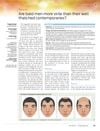 8 citations,
June 2020 in “Dermatologic Therapy”
8 citations,
June 2020 in “Dermatologic Therapy” Hair loss lowers quality of life, causing embarrassment, frustration, and sexual rejection.
4 citations,
April 2020 in “Reports of Practical Oncology & Radiotherapy” Prostate cancer patients need early psychological and sexual support during radiotherapy to improve their quality of life.
 August 2016 in “Journal of evolution of medical and dental sciences”
August 2016 in “Journal of evolution of medical and dental sciences” Most acne patients were young males with face acne, with many experiencing worsening in summer and diet-related aggravation.
 1 citations,
July 2017 in “Frontiers in Communication”
1 citations,
July 2017 in “Frontiers in Communication” Using complex medical terms can make people want to seek medical help faster.
 17 citations,
May 2016 in “Journal of Psychosomatic Research”
17 citations,
May 2016 in “Journal of Psychosomatic Research” Illness perception affects mental health and quality of life in Chinese alopecia patients.

research Acne
4 citations,
January 2019 Acne is a common skin condition that can be influenced by diet, lifestyle, and hormones, and requires a treatment approach that includes psychological considerations.
 2295 citations,
August 2012 in “The international journal of transgenderism/International journal of transgenderism”
2295 citations,
August 2012 in “The international journal of transgenderism/International journal of transgenderism” The guidelines recommend informed consent for gender-affirming treatments and stress the importance of personalized, culturally sensitive care for transgender individuals.
 21 citations,
June 2009 in “Current Medical Research and Opinion”
21 citations,
June 2009 in “Current Medical Research and Opinion” Most men with hair loss worry, try self-treatments, and delay doctor visits due to cost, uncertainty, and embarrassment.
 49 citations,
June 2009 in “Seminars in Cutaneous Medicine and Surgery”
49 citations,
June 2009 in “Seminars in Cutaneous Medicine and Surgery” The cosmetic industry should adapt to the varied beauty standards of ethnic groups and offer specialized treatments.
 6 citations,
April 2004 in “Dermatologic Surgery”
6 citations,
April 2004 in “Dermatologic Surgery” Finasteride showed limited hair growth and low patient compliance in treating male pattern baldness.
 16 citations,
January 2019 in “Neuropsychobiology”
16 citations,
January 2019 in “Neuropsychobiology” People with Lichen Planopilaris tend to be more depressed, have lower self-esteem, and a worse quality of life.
 2 citations,
January 2019 in “Skin appendage disorders”
2 citations,
January 2019 in “Skin appendage disorders” Higher social status is linked to earlier diagnosis and better treatment results for Frontal Fibrosing Alopecia in women.
 14 citations,
January 2019 in “Skin appendage disorders”
14 citations,
January 2019 in “Skin appendage disorders” PFS might be a delusional disorder with potential to become mass psychogenic illness.
 40 citations,
January 2010 in “Indian Journal of Dermatology, Venereology and Leprology”
40 citations,
January 2010 in “Indian Journal of Dermatology, Venereology and Leprology” Certain diets can affect skin conditions, but more research is needed to understand these relationships fully.
 2 citations,
December 2023 in “JEADV. Journal of the European Academy of Dermatology and Venereology/Journal of the European Academy of Dermatology and Venereology”
2 citations,
December 2023 in “JEADV. Journal of the European Academy of Dermatology and Venereology/Journal of the European Academy of Dermatology and Venereology” The document suggests a new way to categorize skin and mind disorders into two main groups to reduce confusion.
 24 citations,
June 2018 in “Expert Review of Pharmacoeconomics & Outcomes Research”
24 citations,
June 2018 in “Expert Review of Pharmacoeconomics & Outcomes Research” Microneedle technology is beneficial for drug delivery and could make vaccinations cheaper and more accessible.
 15 citations,
February 2017 in “Nursing Clinics of North America”
15 citations,
February 2017 in “Nursing Clinics of North America” Targeted cancer therapies can cause skin side effects, which should be treated early to help patients' quality of life and treatment adherence.
23 citations,
October 2020 in “Anais brasileiros de dermatologia/Anais Brasileiros de Dermatologia” Tailored treatments for alopecia areata are recommended based on severity and patient needs.
January 2024 in “Cosmetics” Menopause worsens skin, hair, and nails, affecting self-esteem and quality of life.
 12 citations,
July 2012 in “Social Psychological and Personality Science”
12 citations,
July 2012 in “Social Psychological and Personality Science” Men with shaved heads are seen as more dominant but older and less attractive.
 March 2024 in “World Journal Of Advanced Research and Reviews”
March 2024 in “World Journal Of Advanced Research and Reviews” Educators who survived COVID-19 faced physical, psychological, and social challenges but overcame them with resilience and support, highlighting the need for schools to provide better health and psychological care.
 November 2022 in “Current Psychology”
November 2022 in “Current Psychology” Ads showing gradual change work better for people less focused on new beginnings, while ads showing immediate change work better for those highly motivated by fresh starts.
 65 citations,
July 2013 in “International Clinical Psychopharmacology”
65 citations,
July 2013 in “International Clinical Psychopharmacology” Mood stabilizers like lithium and anticonvulsants have side effects that can lead to patients stopping their medication, and managing these effects is important for treatment adherence.
 2 citations,
October 1998 in “Family Practice”
2 citations,
October 1998 in “Family Practice” New oral treatment, finasteride, effectively and safely treats common hair loss.
 5 citations,
January 1984 in “Journal of psychosomatic obstetrics and gynecology/Journal of psychosomatic obstetrics and gynaecology”
5 citations,
January 1984 in “Journal of psychosomatic obstetrics and gynecology/Journal of psychosomatic obstetrics and gynaecology” The treatment reduced hair growth and testosterone in women with excess hair and had some effects on stress responses.
 6 citations,
December 2013 in “Medical Journal of Australia”
6 citations,
December 2013 in “Medical Journal of Australia” Bald men are not more virile and may have fewer sexual partners.
 April 2024 in “Canadian Women s Health Today”
April 2024 in “Canadian Women s Health Today” PCOS treatment focuses on lifestyle changes and specific medications to manage symptoms and complications.
 16 citations,
November 2018 in “Singapore Medical Journal”
16 citations,
November 2018 in “Singapore Medical Journal” Primary care for PCOS focuses on lifestyle changes, medication based on symptoms, and mental health, with diabetes screening and specialist referral for severe cases.
 76 citations,
January 2007 in “American Journal of Clinical Dermatology”
76 citations,
January 2007 in “American Journal of Clinical Dermatology” Women with PCOS often have skin problems like excessive hair, acne, hair loss, and dark patches, which can be treated with hormonal and non-hormonal therapies.
 42 citations,
February 1985 in “Journal of the American Academy of Dermatology”
42 citations,
February 1985 in “Journal of the American Academy of Dermatology” Excessive hair growth can be assessed by history, exam, and blood tests, and treated with medication like dexamethasone, birth control pills, and spironolactone.



























